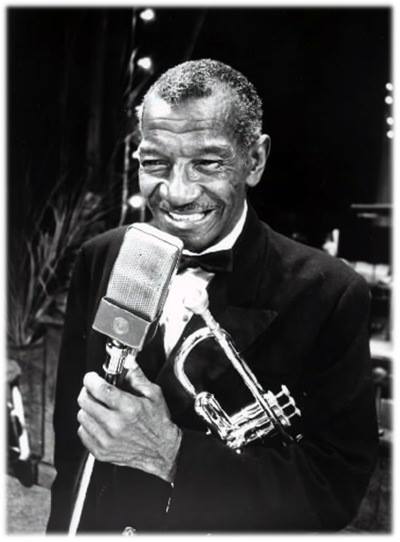Jabbo Smith, born as Cladys Smith (December 24, 1908 – January 16, 1991) was an American jazz musician, known for his virtuoso playing on the trumpet.
Jabbo Smith was born in Pembroke, Georgia. He was the son of a barber and a church organist. After his father died, Smith and his mother moved to Savannah when he was four. His mother found it increasingly difficult to care for him and at age six he was placed into the Jenkins Orphanage Home in Charleston, but she found employment in the Home in order to be near to him.
The Jenkins Home placed heavy emphasis on music education and it was in this setting that Smith took up trumpet and trombone at the age of eight and began touring the country with a student band at the age of ten.
Smith left The Jenkins Home at the age of 16 and headed north to make his mark on music. He kept a promise to his mother never to work for less than $100 dollars a week. Smith found employment in a number of top bands, the most important of which were Charlie Johnson’s Paradise Ten. This group included arranger Benny Carter on alto and Duke Ellington. Smith played on the 1927 recording of Black and Tan Fantasy. He turned down an offer to join the Ellington Orchestra that same year because of money.
Smith was stranded in Chicago in 1929 while on the road with “Keep Shufflin'” following the gangland killing of Arnold Rothstein, the financier of the show. Smith then formed his Rhythm Aces, a quintet with whom he recorded nineteen songs in 1929. These works attracted the attention of Roy Eldridge, who adopted some of Smith’s speed into his own playing. Toward the end of the 1930s, Smith gradually withdrew from serious music activity. He led a group for a while at the 1939 World’s Fair in New York and gigged in a Newark club called the Alcazar.
It was there that he encouraged a 17-year-old Newark singer who sat in at the Alcazar from time to time to enter a talent show at the Apollo Theater in Harlem. She won and got her start. The Singer, The Divine One, was Sarah Vaughn.
From there Smith moved to Milwaukee where he married, did some local playing, and enjoyed the security of a steady job with a car rental agency, fading away into quiet oblivion for 20 years. Around 1960, Smith recorded two albums, and in 1979, was a guest artist in the musical One Mo’ Time.
He also made appearances at several jazz festivals, toured Europe, and performed at the West End Cafe, the Bottom Line, and the Village Vanguard, all in New York. One of his last public performances was in Berlin in 1986.
Jabbo Smith died in January of 1991 at age 82.
Written by Dianne Washington

